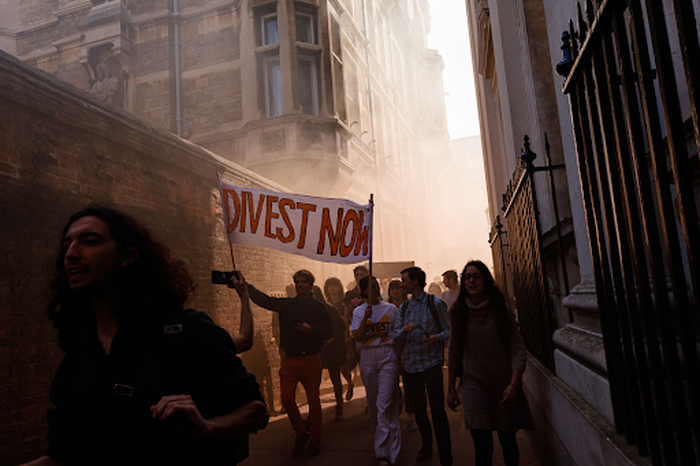St John’s to divest from all ‘meaningful’ investments by 2030
The College have announced a series of plans to reach net zero emissions by 2050

St John’s College has announced their commitment to divest from all “meaningful” investments in fossil fuel industries by 2030.
The announcement focuses on the College’s indirect investments, having removed all direct investments in fossil fuels in 2013.
As part of this announcement, the College has launched “a series of ‘big and demanding’ climate crisis commitments” with the aim of reaching net zero greenhouse gas emissions by 2050.
Last year, the College announced its ambitions to tackle the climate crisis, focusing on reducing greenhouse gas emissions to net zero before 2050 and to achieve a steep reduction in scope 1 and 2 carbon emissions by 2030.
Today’s announcement builds on this through College’s new ‘manifesto for change’, which aims to halve scope 1 and 2 emissions by the end of 2030.
Scope 1 emissions are “direct emissions generated onsite”, such as gas which is burnt in College boilers. Scope 2 emissions are purchased electricity and heat.
In the manifesto, the College set out plans to reduce gas and water consumption and improve energy efficiency in college buildings. This will include a “multi-million pound financial plan” which includes replacing windows, changing boilers, and installing new insulation.
Heather Hancock, Master of St John’s, who launched the manifesto said that the commitments to tackling climate change “will be embedded in every aspect of life” at the College.
She added: “Addressing the climate emergency affects every element of our individual and collective lives. There is no trade-off between academic progress and climate change. We want St John’s to have another 500 years of supporting world-leading learning and research. That means playing a full and active part in dealing, now, with the potentially catastrophic issue of climate change.”
“At St John’s we have decided to focus our efforts and resources on the big, demanding changes where we can see the greatest return. We are attaching a sense of urgency to making headway on our longer term commitments, and we are determined to ‘do’ rather than just discuss what ought to be done.”
The College will also aim for “exemplary zero-carbon standards for any new operational buildings” according to the manifesto, as it is currently planning to repurpose existing buildings on its main site.
Hancock stated: “Our headline commitment on reducing emissions to zero by 2050 is a powerful statement. We’ve now made a bold move towards delivering that commitment, setting targets and deciding where to focus, to have the greatest impact within a decade.
“We are building the data and evidence base to underpin our programme, and developing a nine-year plan to deliver an ambitious carbon reduction target,” Hancock added.
“It will be a stretch and it requires the College to keep focused on the big picture. But challenging ourselves is the right thing to do if we genuinely want to make a difference and make it soon.”
She continued: “St John’s has extraordinarily talented academics working to help the world get its response to climate change right. That’s the biggest difference the College can make at the global level. Collegiate Cambridge and the city also need to work together on collective solutions for some obstacles we all face – such as getting enough electricity into the centre of Cambridge to replace the high levels of gas consumption currently needed for heating. Finding the right renewable energy solution is essential if we want to reduce emissions across a large part of our main site.”
18 colleges have announced full or partial divestment plans to date, while 14 colleges are yet to commit to removing either direct or indirect investments. Four colleges - Gonville and Caius, St Catharine’s, King’s and Homerton - while they are not currently directly invested in fossil fuel industries, do not meet XR’s definition of partial divestment, since they have not ruled out holding direct investments in the future.
Hancock stated: “There is no compromise where climate change is concerned. This is something we have to do because the global emergency cannot be ignored - it is the defining issue of our time.”
 News / Ski mask-wearing teens break into Caius accommodation27 March 2025
News / Ski mask-wearing teens break into Caius accommodation27 March 2025 News / Trinity librarian loses discrimination case over denied term-time leave25 March 2025
News / Trinity librarian loses discrimination case over denied term-time leave25 March 2025 Fashion / The Cambridge puffer: a debate 27 March 2025
Fashion / The Cambridge puffer: a debate 27 March 2025 Lifestyle / Notebook: term time trips27 March 2025
Lifestyle / Notebook: term time trips27 March 2025 News / Uni offers AI ‘research clinics’ to academics and students 26 March 2025
News / Uni offers AI ‘research clinics’ to academics and students 26 March 2025






